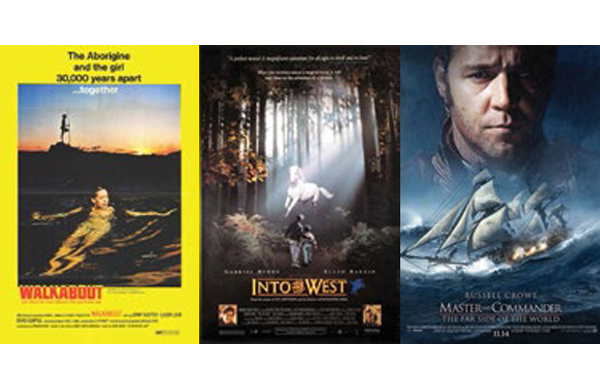Walk, ride or sail, your epic adventure awaits around the world.
Walkabout (1971)
In the most shocking circumstances possible, a teenage girl (Jenny Agutter) and her younger brother are set adrift in the Australian outback. Struggling to survive, they come across an aboriginal youth (David Gulpilil) in the middle of his solo “walkabout,” the tribal coming-of-age custom. The collision of their cultures creates the nervous appeal of Walkabout, the mesmerizing and visually dream-like 1971 classic that helped kick off a great era in Aussie filmmaking. Director Nicolas Roeg (The Man Who Fell to Earth) is very much in a searching, ’60s-era mode, and not everything in the film has aged perfectly. But for its stunning grasp of the desert — nobody’s ever captured heat waves rising from the earth like Roeg does — and unflinching look at how the walkabout is everybody’s transformation ritual (the audience is included in this process), Walkabout remains a fascinating fever-dream.
Into the West (1993)
Although the two Riley lads live in Dublin, their blood is in the countryside — or so their grandfather, a member of the Irish gypsies known as “travelers,” believes. He gives the city boys a white horse, and what else could they do with this mighty animal but ride him into the green west of Ireland, beyond the reach of underhanded horse breeders, the police, and their own exasperated father (Gabriel Byrne)? Mike Newell’s wonderful 1993 film captures the thrill of children reacquainting themselves with their roots, a defining adventure that includes tough revelations and great excitement. Despite the terrific performances by young actors Ruaidhri Conroy and Ciaran Fitzgerald, this is less a kids’ movie than a full-blooded fable about identity and self-exploration. By discovering something ancient, the Rileys discover something new.
Master and Commander: The Far Side of the World (2003)
Nautical readers are so infatuated with Patrick O’Brian’s seafaring novels that this 2003 film adaptation probably had too many expectations surrounding it. But taken on its own, it’s both a ripping adventure yarn and a delicate character study — the latter coming mostly in its look at the friendship between Capt. Jack Aubrey (Russell Crowe in fine form) and Dr. Stephen Maturin (Paul Bettany), whose voyages during the Napoleonic Wars are tracked by O’Brian through his literary series. Director Peter Weir makes us believe we’re aboard H.M.S. Surprise, as we hear every groaning timber and flapping sail; the ship’s derring-do off the coast of South America is marvelous to behold. A side trip to the Galapagos Islands — the film’s only sequence on land — gives a heady glimpse of nature in full flower, a contrast to the civilized warfare of men. For all the fun, the film leaves behind a lovely sense of how Aubrey and Maturin keep the human flame burning despite their extreme circumstances. They read, they play music (violin and cello), they hold deep conversations. Finding one’s place on the compass has more than one meaning in this watery world.



